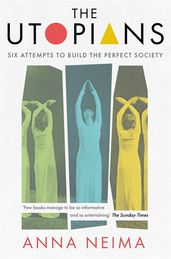Synopsis
'Neima’s book, impeccably researched and beautifully written, will be an inspiration for anyone looking to an alternative future today.' - Stella Tillyard, author of Aristocrats and The Great Level
'Deeply interesting and a pleasure to read, The Utopians illuminates the history of “social dreaming” at a time when it has never been more needed.' - Alison Light, author of A Radical Romance, Common People and Mrs. Woolf and the Servants
The Utopians is the remarkable story of six experimental communities – Santiniketan-Sriniketan in India, Dartington Hall in England, Atarashiki Mura in Japan, the Institute for the Harmonious Development of Man in France, the Bruderhof in Germany and Trabuco College in America – that sprang up in the aftermath of the First World War.
Each was led by charismatic figures who dreamed of a new way of living. Rabindranath Tagore, Dorothy and Leonard Elmhirst, Mushanokoji Saneatsu, G. I. Gurdjieff, Eberhard and Emmy Arnold and Gerald Heard all struggled to turn ambitious ideals into reality. They – and their fellow communards – left their jobs, their homes and their social circles. They faced mockery and persecution, penury, hunger and discomfort, and their own doubts about whether their efforts to change society would ever make a difference.
Anna Neima’s absorbing and vivid account of these collectives, from creation to collapse, reveals them to be full of eccentric characters, outlandish lifestyles and unchecked idealism. They were dramatic, fractious places where high ideals collided with the need to feed the chickens, clean the toilets, bring up squabbling children and grow the grain for the daily bread.
These communities were small in scale and dismissed in their time. Yet, a century later, their influence still resonates in realms as disparate as progressive education, environmentalism, medical research and mindfulness training. They provided, and continue to provide, a rich store of inspiration for those who aspire to improve the world. Without them, the post-war world would have been a poorer place.
Details
Reviews
Fascinating and richly documented . . . This is Neima’s first book, and should not be her last. She writes with a novelist’s eye for detail and clearly revels in the eccentrics she has to chronicle — Gurdjieff selling sparrows painted yellow, for example, to fund his trek from Russia to France. Few books manage to be so informative and so entertaining.
[Neima] offers an original perspective on the entire period and a new way of navigating its artistic and ideological upheaval . . . Fascinating . . . by showing how a global crisis can lead people to question tradition and reshape society, the subject remains important to this day.
[Neima] ranges with impressive confidence across the world . . . pleasingly non-judgemental and avoids laborious analysis. Reading this book is perhaps the most delightful way to indulge in elite communism in the 21st century, other than being recruited to a Californian tech start-up.
Neima’s brisk storytelling and eye for the illustrative quote and telling anecdote conveys the thrilling and sometimes scandalous strangeness of these experiments . . . highly readable
